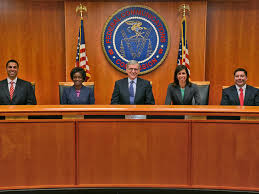Improving Collegiality at FCC's 8th Floor

Yesterday's FCC Blog post by a commissioner, "Stop Unfairly Censoring Commissioners", highlights a growing collegiality problem at FCC that is not doubt impacting FCC productivity and effectiveness. As someone who worked nearly 25 years at FCC this is sad. However, it has been building for years and was not caused by one party or one commissioner. While it may be easy to forget the Chairmanship of Kevin Martin, similar problems existed then also. Since Chmn. Martin succeeded Chmn. Powell - the chairman in recent history who created the maximum harmony at FCC - and both were appointed by Bush43, it is clear that no single administration or party has a monopoly on creating such problems.
In the interest of being constructive, I humbly offer some suggestions for FCC leadership to consider for improving harmony at the top for the benefit of all:
- A temporary moratorium by all 8th Floor residents, not just commissioners, on Twitter other than brief factual statements, e.g. "Will be speaking Chicago next week at XYZ conference". The Commission lived without Twitter for several generations and maybe a pause is needed to let all involved focus on how it can be most constructively used.
- A similar pause in use of the FCC Blog while a consensus-based framework is developed for its use.
- Use of closed Commission meetings from time to time to discuss internal processes. The Government in Sunshine Act generally requires open meetings for multiple member agencies BUT there are exceptions. Specifically 5 USC § 552b(c)(2) provides one for meeting that "relate solely to the internal personnel rules and practices of an agency". As far as I can tell, the last time there was an FCC closed meeting on any matter was the one announced below on November 1, 2001:
- The senators on the Senate Committee on Commerce, Science, and Transportation should get together and discuss whether they really want in the long term an FCC that is dominated by former congressional staffers. (While Comm. Clyburn is not literally a former Hill staffer, she is clearly well connected there.) This custom dates from the 1990s in the Clinton Administration as a general "work around" to get commissioners in various regulatory agencies confirmed. While it solved that problem, it has created new ones including the lack of anyone who has had real experience in the regulated industries since James Quello was appointed first in 1974. In particular, no one who has worked in Silicon Valley has ever been nominated. No one has ever tried top meet the payroll of an entrepreneurial firm that was waiting for nonroutine FCC approvals of a new FCC-regulated technology. Hill alumni have many skills, but a near monoculture of them may well be a contributor to the current situation.
- A consensus-based review of the delegations of authority contained in Part 0, Subpart B. Most of these have not been updated in generations. It is clear that some commissioners are upset over actions taken on delegated authority that they are not consulted on. It is also clear that there are many issues, particularly obscure noncontroversial technical issues that are being voted on by the commissioners that, in all due respect, they do not add value to. The requirement for en banc votes either at a meeting, by circulation, or by "consent agenda" slows down resolution of matters that can slow down innovation. This is discussed in greater length in my TPRC paper on FCC productivity in spectrum policy. If the board of General Motors had to see and vote on every design detail of next year's Chevy, it would never be produced. FCC should consider models of other US multimember commissions and also how Ofcom delegates matters to its staff. The commissioner should generally vote on the issues that are important to them and give staff real guidances on what is delegated and more general policies should be developed for dealing with such delegated matters with reasonable checks and balances. This should improve 8th Floor harmony.

Harmony
UPDATE
A 2/26/16 story on this blog post in TRDaily stated:
"In addition, he said senators should consider whether congressional staffers should continue to be confirmed as FCC Commissioners, saying such confirmations have resulted in many people with no experience in the industries the FCC regulates."
Note that this differs in key respect from the actual original post above which states:
"Hill alumni have many skills, but a near monoculture of them may well be a contributor to the current situation."
The issue is not whether former Hill staffers are qualified to be commissioners at FCC, but rather whether this should be the background of most commissioners.




![Validate my RSS feed [Valid RSS]](valid-rss-rogers.png)

